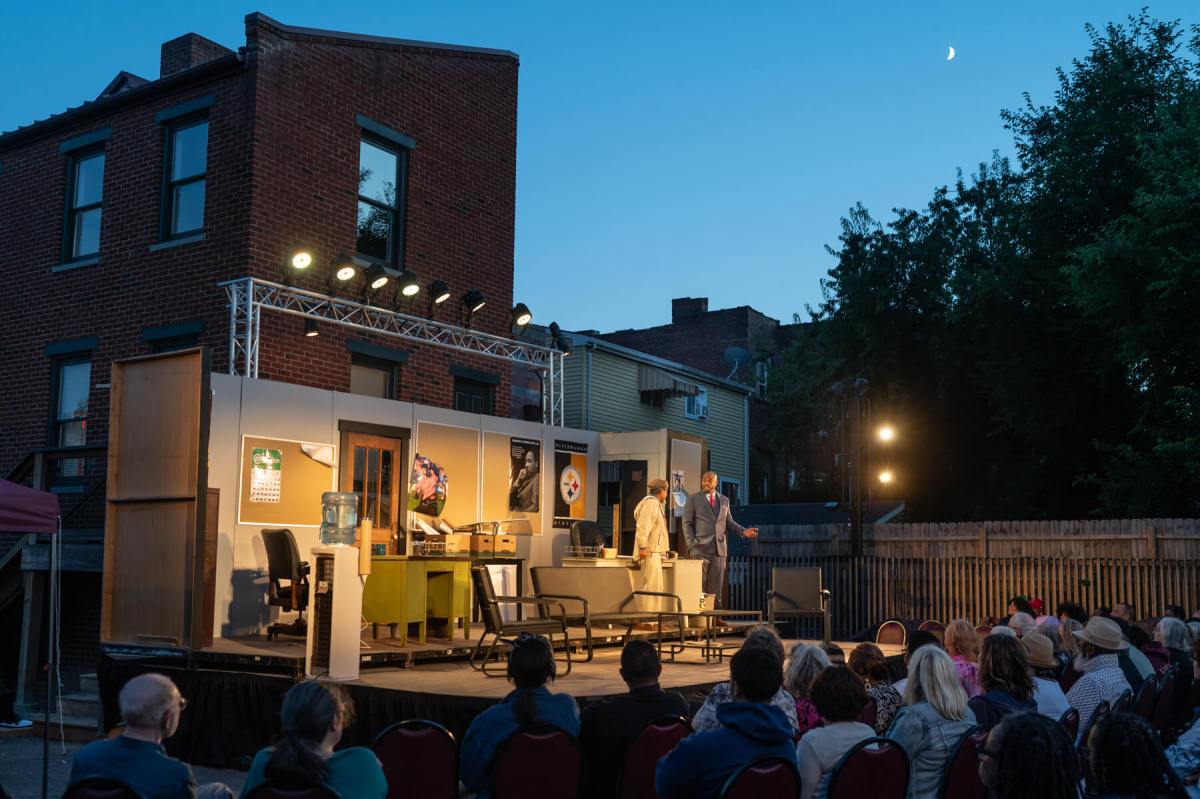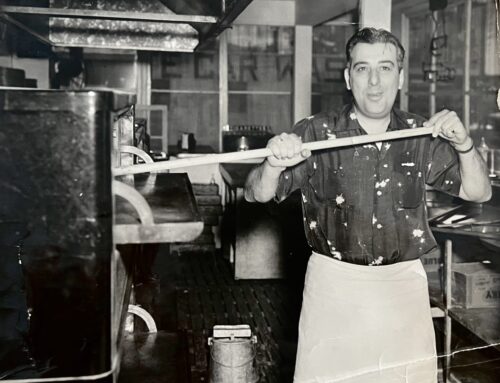The story of the Hill District is one of the vibrant Black culture that fueled Wilson’s career. It’s also a story of redevelopment initiatives that harmed the conditions in which that cultural richness could flourish.
By Gregory Laski
This story was originally published by PublicSource, a nonprofit newsroom serving the Pittsburgh region. For more of its journalism, visit www.publicsource.org.”
Across the pavement of Bedford Avenue in the Hill District, two structures stare at one another, as if their facades want to speak about the history they’ve weathered.
The August Wilson House sits on one side. Recently restored, the building was the childhood home of the Pulitzer Prize-winning playwright born in the Hill District in 1945. On the other stand Bedford Hill apartments, a mixed-income residence constructed in the early 2000s to replace “slum and blight,” according to an Urban Redevelopment Authority [URA] statement. Fourteen residents refused to sell their homes to make way for the new housing.
Beginning Aug. 17, Pittsburgh Playwrights Theatre Company gives voice to the century of conflicted history residing within those structures in its staging of August Wilson’s final drama, “Radio Golf.”
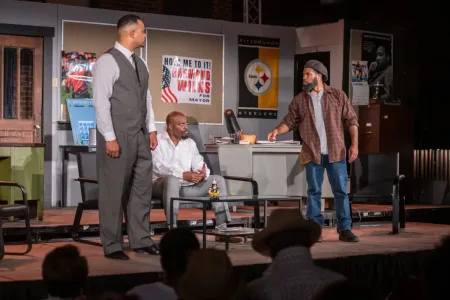
From left, Rich Dickson as businessman Roosevelt Hicks, Roosevelt Watts, Jr. as real estate developer and aspiring mayor Harmond Wilks and Maurice Redwood as Sterling Johnson, the neighborhood handyman representing the working class, perform a preview of Pittsburgh Playwrights’ production of August Wilson’s “Radio Golf” at the August Wilson House in the Hill District on Aug. 11. Redwood’s character, Sterling Johnson, objects to the proposed demolition of a house he’s been working on. (Photo by Stephanie Strasburg/PublicSource)
In “Radio Golf,” which premiered shortly before the playwright died in 2005, Wilson reflected on the history of redevelopment efforts in the Hill District. But the play, set in 1997, also looked ahead to the 21st century. In it, Wilson asked what it means to ‘redevelop’ the Hill District, and who gains and who loses.
For those who make their lives on the Hill today, the play’s questions remain timely, the 2021 election of a Black mayor notwithstanding.
The first Black mayor
When Pittsburgh Playwrights produced “Radio Golf” in 2013, Founder and Artistic Director Mark Clayton Southers played the lead role, Harmond Wilks. Wilks is a Hill District-born, Ivy League-educated real estate developer who is running to become Pittsburgh’s first Black mayor.
“It’s about time,” remarks a character in the play about Wilks’ candidacy. “We need a black mayor. White folks had a hundred mayors in a row.”
Luke Ravenstahl was Pittsburgh’s mayor in 2013 — the 55th person to occupy that office. All were white, and, with the exception of Sophie Masloff, men.
Contemplating the return of “Radio Golf” to the stage, Southers looked back on the Pittsburgh of 2013. “It probably will be viewed as a period piece now,” Southers said of this production.
In one way, at least, it might. Ed Gainey made history when he was sworn in as the first Black mayor of the city in 2022.
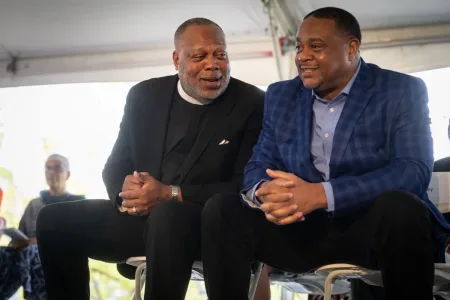
The Rev. Dale Snyder, left, pastor at Bethel AME Church, talks with Mayor Ed Gainey at the Restorative Justice Rededication Ceremony for Bethel AME Church on April 14, 2023, at the former site of the famed Lower Hill church. Bethel hosts Pittsburgh’s oldest Black congregation, which was displaced from the Lower Hill to the Middle Hill after the former site was razed in the 1950s to make way for the Civic Arena and other “urban renewal” projects. (Photo by Stephanie Strasburg/PublicSource)
But “Radio Golf” imagined more than equitable political representation. The Wilks character also leads an effort to bring Whole Foods and Starbucks to the Hill via his “Bedford Hills Redevelopment” company.
In the play’s central conflict, the future-oriented vision of Wilks, a representative of the Black middle class, runs up against the claims of Joe Barlow, a blue-collar Hill District elder. Barlow’s Wylie Avenue home, and its rich family history, is set for destruction. The ensuing tensions pit various community interests against one another.
Redevelopment and displacement
The story of the Hill District is one of the vibrant Black culture that fueled Wilson’s career. It’s also a story of redevelopment initiatives that harmed the conditions in which that cultural richness could flourish.
No project was more disruptive than the 1950s urban renewal efforts resulting in the Civic Arena, home of the Pittsburgh Penguins before their relocation to PPG Paints Arena in 2014. Physically dividing the Hill from Downtown, the arena’s construction destroyed hundreds of businesses and displaced thousands of residents.
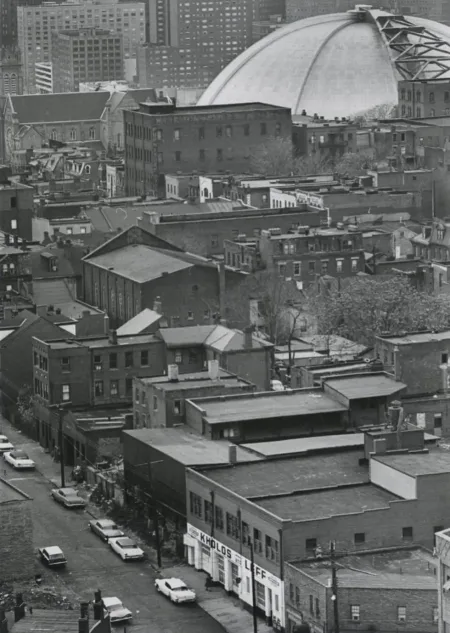
The recently constructed Civic Arena stands in the background, with the Hill in the foreground, around 1967. (Melvin Seidenberg Photographs, c. 1828-1988, MSP 566, Rauh Jewish Archives, Detre Library and Archives, Senator John Heinz History Center)
Those most impacted had few opportunities to articulate a collective voice of opposition to the plans. Mayor David Lawrence worked in concert with the business and philanthropy communities as well as his tightly controlled City Council.
In 1946, city government created the URA, a body specifically charged with executing the effort. Lawrence became its chairman.
Susheela Nemani-Stanger, who took on the post of URA executive director in 2023, confronts this history every day.
“I feel consistently compelled to apologize for our past work,” said Nemani-Stanger. “It is my role to own that and to do what we can to address our past activities.”
As one example, Nemani-Stanger cites the Greater Hill District Neighborhood Reinvestment Fund, a community-led investment fund that seeks to return to the Hill District some of the incremental taxes generated on the Lower Hill development site, where the FNB tower stands and construction of a Live Nation music venue is anticipated to begin in September. The URA and the Sports and Exhibition Authority own the parcels of land on the site.
Yet she acknowledges that no program or funding stream will erase the URA’s past.
Its presence haunted the Hill again when residents recently noticed “for sale” signs posted on URA-owned properties. The authority’s aim in posting those signs was to “elevate awareness” about the availability of the properties and to “hold the URA accountable for the condition of our properties,” according to Nemani-Stanger.
“But it is clear the signs were problematic in communities where we struggle to rebuild trust.”
‘They ain’t built nothing yet’
For Marimba Milliones, the fear awakened by the “for sale” signs came as no surprise. It sits at the foundation of a structural truth spanning generations.
“There always has to be trust-building that has to happen between the community and the government, and I don’t know if that will ever change,” said Milliones, president and CEO of the Hill Community Development Corporation [Hill CDC]. The Hill CDC and others criticized the URA for posting the signs without community process, and the agency removed the signs.
Having led the group since 2011, Milliones has worked with multiple mayors and public authority leaders. Even as each administration has had different priorities, Milliones said, the “throughline” is that “the city and the URA still own a large portion of the neighborhood.”
Wilson never mentioned a particular mayor or the URA by name in his play. But the promises of renewal made and broken by past Pittsburgh leadership animate “Radio Golf.”
“They said they tore it down so they could build something,” remarks one character. “They ain’t built nothing yet.”
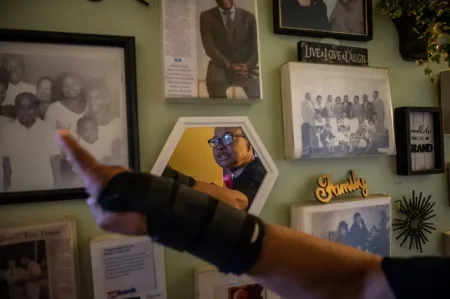
Gail Felton, former president of the Bedford Dwellings tenant council, points to a family photo on her apartment wall. Felton raised her children in Bedford Dwellings, part of a multi-generational lineage of family in the Hill District. Felton said she has turned down offers to move elsewhere, but now plans are in motion to redevelop Bedford Dwellings. (Photo by Stephanie Strasburg/PublicSource)
The line rings true for Gail Felton, who recently retired as president of the Bedford Dwellings tenant council, and remembers when the plans for Bedford Hill apartments — mixed-income housing distinct from the much older Bedford Dwellings — were floated in the early 2000s.
“I can’t say that’s a lie,” Felton said of the suspicion Wilson’s character expresses within the late-1990s setting of “Radio Golf.”
“They were talking about doing Bedford Hill, but people didn’t believe it would happen,” Felton recalled, referring to the apartments across the street from the Wilson House. Bedford Dwellings, where Felton resides, is currently slated for redevelopment.
‘400 years of oppression’
Today, the suspicions that Wilson’s characters voiced continue to resonate, even as new construction raises hopes for some on the Hill.
Kimberly Ellis navigates these tensions in the myriad parts she plays in the life of the Hill. Ellis is the director of community arts and culture for the Buccini/Pollin Group [BPG], the Delaware-based company selected by the Penguins for the current Lower Hill redevelopment project. She’s also the executive director of the Historic Hill Institute, which helped to restore the Wilson House, and Wilson’s niece.

Mayor Ed Gainey leans down for a photo with Dr. Kimberly C. Ellis, director of Community, Arts and Culture for The Buccini/Pollin Group’s Pittsburgh office, at the Restorative Justice Rededication Ceremony for Bethel AME Church on April 14, 2023. Dr. Ellis has been heavily involved in the Lower Hill redevelopment plans. (Photo by Stephanie Strasburg/PublicSource)
“It’s true that the Historic Hill District should be concerned about gentrification,” Ellis acknowledged. “However, the opposite is rot-ification, and that’s what we’ve been dealing with, given the lack of development residents experience today.”
Ellis views Wilks the character as someone who seeks to harmonize past and future. In the play, he attempts to save Barlow’s Wylie Avenue home.
Southers, who portrayed Wilks in the 2013 production, does not deny that benefits have accrued from revitalization efforts. Still, he understands the community’s suspicions about change, which have been cultivated by the routine indignities of racism.
“For Black folks, it’s such a predicament that we’re in,” Southers explained. “Our DNA is responding to 400 years of oppression, mentally and physically. It’s a constant grind to keep your head above water.
“So when you see new things, and you’re used to seeing old things, you’re torn.”
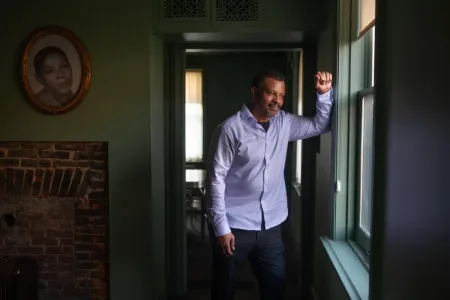
Montae Russell, a Homestead native and director of Pittsburgh Playwrights’ “Radio Golf” production, stands for a photo in the August Wilson House in the Hill District on Aug. 5. Russell, who appeared in the 2001 Broadway production of Wilson’s “King Hedley II,” returned home to Pittsburgh this summer to direct “Radio Golf.” He recognizes the Wilks character as one of those developers he heard about as a child when talk of the “Pittsburgh Renaissance” circulated in the air. (Photo by Stephanie Strasburg/PublicSource)
Community vision, community voice
Throughout his city council tenure, Daniel Lavelle, who represents the Hill, has witnessed increasing harmony between local government and community needs. “We’re in a unique place in time now,” said Lavelle, who was elected in 2010.
“We have a lot of community vision aligned with political vision,” he continued, pointing to the collaborative work of the Hill CDC, City Council and the Gainey administration in recent redevelopment efforts.
But ‘community’ is a designation that never fully encompasses all the people it seeks to embody. Carl Redwood Jr., who chairs the board of the Hill District Consensus Group, arrived at that truth through decades of firsthand experience.
Early in the Lower Hill redevelopment planning process, Redwood Jr. attended a meeting with Penguins ownership as part of his work to craft the One Hill Community Benefits Agreement Coalition, a compact that sought to ensure that profits from the renewal project would directly benefit the community.
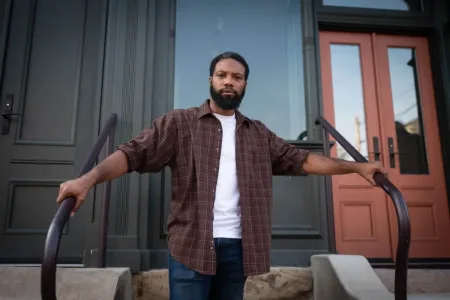
Maurice Redwood, son of Carl Redwood, Jr., plays Sterling Johnson, the neighborhood handyman August Wilson uses to represent the working class, in Pittsburgh Playwrights’ production of “Radio Golf.” He stands for a photo at the August Wilson House in the Hill District, on Aug. 5. For the elder Redwood, questions around social and economic empowerment are the most urgent aspects of “Radio Golf.” (Photo by Stephanie Strasburg/PublicSource)
Another contingent representing the Hill also was involved. The Lower Hill Working Group, consisting of elected officials and community leaders, created the Community Collaboration and Implementation Plan [CCIP], the 2014 document that continues to guide development. Penguins ownership were uncertain how to sort out the various groups and individuals claiming to represent the Hill District, Redwood Jr. recounted, and discussions accordingly stalled.
“Community isn’t just one thing,” he cautioned.
Where in the 1950s eminent domain served as the legal tool to displace residents from the Lower Hill, Redwood Jr. noted, today rising rents and higher taxes drive people out.
“There’s more voice for higher-income folks in the community. Not so much for lower-income folks,” Redwood Jr. said of today’s Pittsburgh.
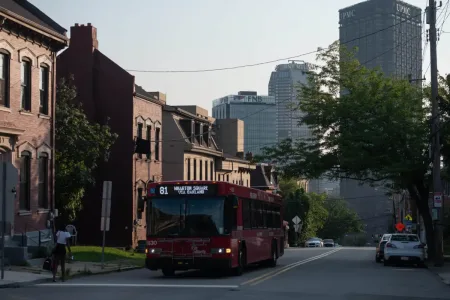
The FNB Tower as seen from the front of the August Wilson House in the Hill District, on Monday, Aug. 5, 2024. (Photo by Stephanie Strasburg/PublicSource)
A prophet in his hometown
DeWitt Walton remembers eating at Eddie’s, on the corner of Wylie Avenue and Kirkpatrick Street, when he first visited the Hill in 1981. Walton came to Pittsburgh as a union organizer fighting to reverse declines in the steel industry that harmed Black laborers in particular.
For Walton, the diner, where Wilson himself would drink coffee and write, embodied the vibrant culture of Black entrepreneurship that flourished on the Hill.
All that vibrancy was gone when he returned on a later visit.
“Wylie Avenue was dead. Unemployment was rampant. The Black economic revitalization disappeared,” said Walton, who grew up in Gary, Indiana, but chose to make Pittsburgh’s Hill his home.
Walton represents the Upper Hill on the Allegheny County Council and participated in the debates surrounding the drafting of the CCIP.
Walton has “mixed emotions” about the document and the ongoing revitalization efforts, which reflect differing visions of what economic development means. To him, such issues boil down to how to create a “greater sense of balance between the haves and have-nots.”
“It is reflective of both August Wilson’s insight, intuitiveness and realization of the inherent conflicts of life in the Black community, and life in any community,” said Walton, affirming Redwood Jr.’s sense of how class tensions play out in the Hill today.
“August Wilson was so insightful and in some ways a prophet.”
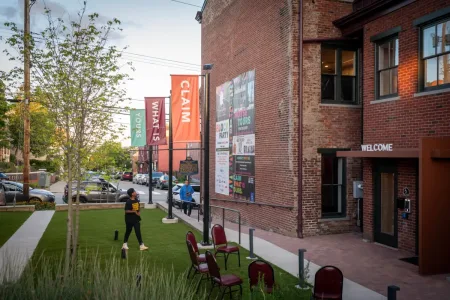
“CLAIM WHAT IS YOURS” read banners alongside the August Wilson House, as people arrive for a preview of Pittsburgh Playwrights’ production of Wilson’s play “Radio Golf” at the August Wilson House on Aug. 11. Across the street to the left is Bedford Hill. (Photo by Stephanie Strasburg/PublicSource)
‘Intergenerational justice’
Ellis agrees that her uncle was a prophet. But she believes that the latest effort to redevelop the Lower Hill was out of the scope of even his vision.
From her vantage nearly two decades after “Radio Golf,” Ellis discerns “intergenerational justice” in the latest Lower Hill redevelopment.
She invokes Bomani Howze, BPG’s vice president for development and president and CEO of OLMEC, a development company.
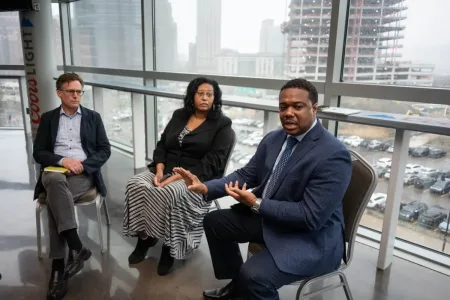
From left, Craig Dunham, senior vice president of development for the Pittsburgh Penguins, Dr. Kimberly C. Ellis, director of Community, Arts and Culture for The Buccini/Pollin Group’s Pittsburgh office, and Bomani Howze, vice president of development for The Buccini/Pollin Group and CEO of OLMEC Development Company, talk with PublicSource about plans for the Lower Hill development as construction of the FNB Tower on the site rises behind them on April 6, 2023, at PPG Paints arena in Downtown. Howze calls the rebuilding work “poetic and sweet justice” after his father’s family was displaced from the neighborhood decades prior. (Photo by Stephanie Strasburg/PublicSource)
Howze’s father, Sala Udin, was displaced from his Fullerton Street home as a child when the Civic Arena project forced Udin and his parents, Howze’s grandparents, from the site.
Now, Howze is rebuilding the same part of the city.
‘A city for all of us’?
Others can’t quite identify such an ending as they look at the site where the FNB tower touches the sky.
At the July 25, 2024, meeting where the URA board cast a key vote necessary for the Live Nation music venue project to proceed, Milliones and other Hill District residents voiced concerns about promises that have yet to materialize, including the Curtain Call public art project.
Renee Wilson, who is the playwright’s cousin, reminded the URA that the Gainey administration has pledged to create “a city for all of us.”
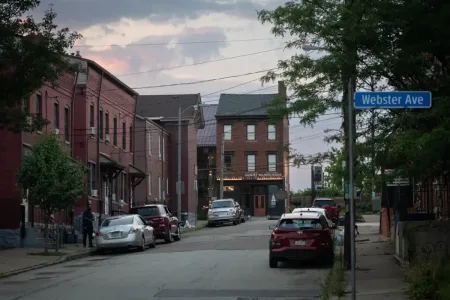
Playwright August Wilson’s childhood home transformed into the August Wilson House, where Pittsburgh Playwrights’ production of his play “Radio Golf” is being staged, as photographed on Aug. 11 in the Hill District. (Photo by Stephanie Strasburg/PublicSource)
“When are we really going to do that?” she asked.
Lavelle, who is vice chair of the URA board, was also present. Citing the limited city budget, Lavelle said the promises can’t come to fruition until the developments get built.
“These things take time.”
The exchange took place at the URA’s Downtown office, in a space called the August Wilson Room.
Gregory Laski writes about culture and civic life. He can be reached at [email protected] or on Twitter/X at @ProfL12.
Quotations from “Radio Golf” (The August Wilson Century Cycle) is copyright © 2007 by The Estate of August Wilson. The Foreword is copyright © 2007 by Suzan-Lori Parks. Published by Theatre Communications Group. Used by permission of Theatre Communications Group.


